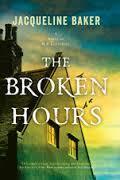What do you think?
Rate this book


230 pages, Kindle Edition
First published September 23, 2014
“When I crossed the room and shut the door, the hair stood on end all up the back of my neck. Though it was light outside, the shadows hung heavily in the corners. I felt a thickness in my throat, as if I could not swallow: that presence I had felt always on the landing and the second floor, it had followed me inside.
It was in my room.”